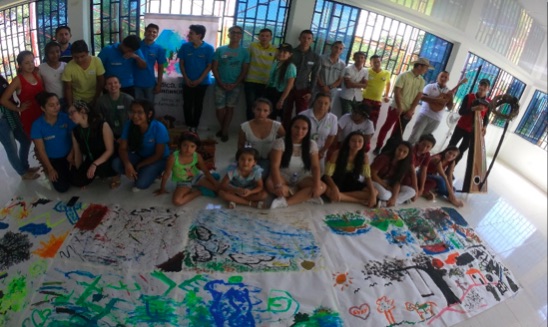FREE FLOW OF INFORMATION
Special to CPNN from the Fundación Escuelas de Paz
The Colombian Government is moving forward in the implementation of the Peace Accord with the Common Alternative Revolutionary Force (FARC) political party and is working to secure a peace deal with the National Liberation Army (ELN). With the peace process in place, Colombia is setting an example to the world for peace and reconciliation after over half a century of armed conflict and severe violence. However, the government cannot alone bring peace to this nation.
That is why the Bogotá-based peace-building NGO, Fundación Escuelas de Paz (FEP) has been supporting peace development in Colombia since 2001. FEP plays a vital part in the emerging multi-level and multi-dimensional approaches to peace-making in Colombia by working with civil society, government, and foreign partners to discuss the importance of diverse paths to peace and promote programs that educate youths on peace-building through a multitude of projects.

FEP employs a range of actions such as research, publication, and peace-building projects, and works closely with conflict resolution field experts to support the fundamental principles of “Culture of Peace” to make peace a right and a responsibility for all citizens, especially for the new generation of Colombians. FEP operates through an interdisciplinary team that works in stimulating environments that strengthen youth networks, teachers, and schools of peace.
Every year, FEP designs and executes conflict resolution and reconciliation type projects. From May 2018 to December 2018, FEP is performing a project titled “Música, Arte y Memoria: Jóvenes del Meta transformando el tejido social” (Music, Art, and Memory: Youths of Meta transforming the social fabric), which is funded by USAID Human Rights Program and FEP. The project includes a series of eight workshops to teach peace-building skills to youths through the use of the arts. Today, recognition of the contributions of arts and culture to peace is real and quickly evolving. It is fueled not only by artist-peace-builders and cultural facilitators, but the interest is also increasing from practitioners of more traditional peacebuilding approaches, such as mediation, facilitation, negotiation, transitional justice, and human rights advocacy.
This year, FEP is getting help from two current graduate students, Valentin Castro and Evan Tueller. Valentin and Evan are both candidates in the Masters of Conflict Resolution Program at Georgetown University. Last December, both students received a fellowship through Georgetown University to go abroad during the summer and work with an organization on peacemaking themes. Valentin and Evan arrived in Bogota, Colombia on June 2, 2018, to begin their 10-week internship at FEP and help design their first peace-through-the-arts workshop for youths living in rural Colombia.
(Continued in right column)
What is happening in Colombia, Is peace possible?
(Continued from left column)
The project takes place in the Department of Meta in two small towns: Mesetas and El Castillo, territories once plagued by extreme violence and armed conflict. Valentin and Evan will help execute peace workshops and develop two products to leave behind with FEP: a video documenting the execution of the first workshop and a template for monitoring and evaluation (M&E) that FEP can use to analyze and measure their overall success better.
The goal of this project is for youth groups belonging to the municipalities of Mesetas and El Castillo to become peace ambassadors for their communities by carrying out non-violent collective actions using mediums such as art and music. Other essential themes within this project include education on human, civil, and political rights, and promoting responsibility and leadership roles at individual and group levels. Upon the completing these peace workshops, the follow-on intent is for the youths to use the skills and lessons learned to replicate and teach smaller peace workshops to other youth groups in their communities. This project will help influence and raise the competence of the young people of Meta as peace representatives on the issues of human rights, conflict transformation, peace-building, and intercultural dialogue.
The first peace-building workshop entailed two parts: one part in the morning and the second one in the afternoon. The first phase is titled “El Canto de Nuestra Memoria: Tu Cancion” (The Song from our Memory: Your Song) and the second half is “Desvelando tu lienzo interior a traves del arte, la danza y la creatividad” (Unveiling Your Inner Canvas through Art, Dance, and Creativity). The first half of the workshop uses music to help individuals understand themselves better by using the space to express themselves through musical instruments, vocal sounds, and dance. These techniques also help enable trust within the students since music is known to have the potential to bring people together. The second half of the workshop entails more dancing and concludes with designing a mural that exhibits how the students view the future in their community. Art is fundamental to the development of a child’s imagination because they cannot create nor achieve anything unless they imagine it first.
Our experience at FEP has been remarkable and eye-opening. The FEP team goes beyond being our colleagues—FEP is our family. Professor Amada Benavides is an excellent leader and seasoned professional with many years of experience in constructing peace. We feel lucky to have had the opportunity to work with the FEP team here in Bogotá and the remote regions of Mesetas and El Castillo. The internship with FEP surpassed our expectations and gave us a chance to work in the field and help execute these art peace-building workshops. This internship experience left us thinking of what Aristotle once said, “The aim of art is to represent not the outward appearance of things, but their inward significance.”
We leave FEP and Colombia with a better understanding of how to achieve peace through the culture of the arts and with a new positive perspective of how Colombians are finding ways to make their tomorrow better.